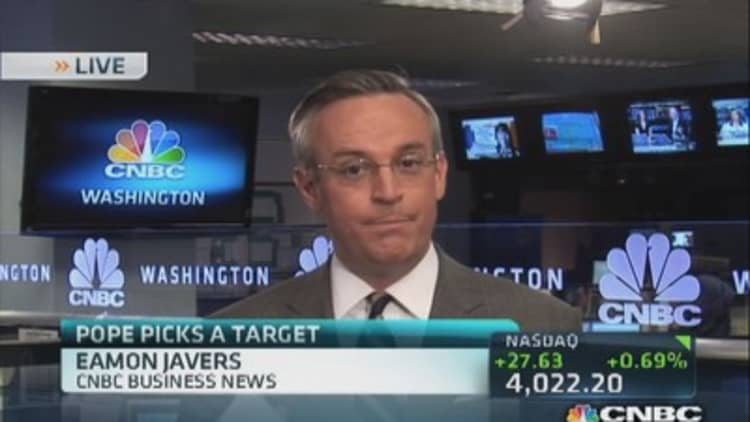
Pope Francis's attack on some of the values of capitalism has reignited a long-running debate about whether the free market is compatible with Christianity.
The recently elected Pope continued his revitalization of the Church with an outspoken statement against the "new tyranny" of "unfettered capitalism."
(Read more: Pope Francis on capitalism)
"Some people continue to defend trickle-down theories which assume that economic growth,encouraged by a free market, will inevitably succeed in bringing about greater justice and inclusiveness in the world,"he wrote, in a direct rebuttal of the theory espoused by free-market thinkers that wealth eventually benefits the whole of society.
"This opinion, which has never been confirmed by the facts, expresses a crude and naive trust in the goodness of those wielding economic power and in the sacralised workings of the prevailing economic system."
With the Catholic Church itself running a bank at the Vatican and historically welcoming to wealthy donors, some may find a disconnect. The church was also notoriously anti-communist during the Iron Curtain years, even excommunicating communists.
Still, the Bible – the Church's founding text -- states pretty clearly that it's tricky for rich men to get into heaven. And there are probably a few multinational companies who could take advice on how to pay their taxes from Matthew 22: 21 on rendering to Caesar what is Caesar's.
One defendant of the theory that business can lift more people out of poverty than philanthropy is Lloyd Blankfein, the Goldman Sachs chief executive, who famously claimed he was doing "God's work"at the investment bank.
The late Pope John Paul II argued that the church's attitude towards capitalism was all down to how it was practised.
"Although decisively condemning 'socialism,' the Church, since Leo XIII's Rerum Novarum, has always distanced itself from capitalistic ideology, holding it responsible for grave social injustices," he said in 1993.
"(The church) recognizes the positive value of the market and of enterprise, but…at the same time points out that these need to be oriented toward the common good."
In essence, no to Gordon Gekko, yes to Bill Gates.
"There have always been parts of the Catholic Church which are more left- and more right-leaning," Anna Rowlands, lecturer in theology and ministry at King's College London, told CNBC.
(Read more: Vatican opens its books)
"The really new development in this is the attack on the trickle-down theory. To pick it out and say that it prevents progress in terms of human dignity and the economy is different. He has taken a very distinctive, strong stance on public policy and the way economic policies have been exported as part of the Western attitude to developing economies."
Before his elevation to the papacy, Pope Francis spent most of his life in Argentina, which is no stranger to financial crisis. This time round, in the euro zone, compared to their Protestant northern neighbors, it is the Catholic countries of Ireland; Spain and Portugal which have been worst hit by the credit crisis (apart from Greek Orthodox Greece).
"With Pope Francis, what we see is someone who lived in Argentina all his life, lived through a financial crisis and experienced what happens when markets make a country go under. He's a non-Westerner reminding the West of what happens when markets go wrong," Abigail Frymann, online editor of Catholic newspaper The Tablet, told CNBC.
The new Pope is also on a mission to tackle one of the Church institutions most open to accusations of corruption. As part of his reforms, the Vatican's bank, the Institute for Religious Works, which is often accused of Mafia links published its first ever annual report this year. In July, the account of a senior cleric, Monsignor Nunzio Scarano, arrested by Italian police in June on suspicion of trying to move 20 million euros illegally, was frozen by the Vatican.
"He has taken control and he has instituted a greater transparency in dealing with actions like money laundering and corruption around the Vatican's bank," Rowlands said.
- By CNBC's Catherine Boyle. Twitter: @cboylecnbc


